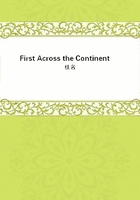
第85章
This time they camped on the north side, and during the night lost one of their boats, which got loose and drifted down to the next village of the Wahclellahs, some of whom brought it back to the white men's camp and were rewarded for their honesty by a present of two knives.
It was found necessary to make a portage here, but a long and severe rainstorm set in, and the tents and the skins used for protecting the baggage were soaked. The journal goes on with the narrative thus:--We determined to take the canoes first over the portage, in hopes that by the afternoon the rain would cease, and we might carry our baggage across without injury.
This was immediately begun by almost the whole party, who in the course of the day dragged four of the canoes to the head of the rapids, with great difficulty and labor. A guard, consisting of one sick man and three who had been lamed by accidents, remained with Captain Lewis [and a cook] to guard the baggage.
This precaution was absolutely necessary to protect it from the Wahclellahs, whom we discovered to be great thieves, notwithstanding their apparent honesty in restoring our boat; indeed, so arrogant and intrusive have they become that nothing but our numbers, we are convinced, saves us from attack.
They crowded about us while we were taking up the boats, and one of them had the insolence to throw stones down the bank at two of our men.
"We now found it necessary to depart from our mild and pacific course of conduct. On returning to the head of the portage, many of them met our men and seemed very ill-disposed. Shields had stopped to purchase a dog, and being separated from the rest of the party, two Indians pushed him out of the road, and attempted to take the dog from him. He had no weapon but a long knife, with which he immediately attacked them both, hoping to put them to death before they had time to draw their arrows; but as soon as they saw his design they fled into the woods.
Soon afterward we were told by an Indian who spoke Clatsop, which we had ourselves learned during the winter, that the Wahclellahs had carried off Captain Lewis' dog to their village below.
Three men well armed were instantly despatched in pursuit of them, with orders to fire if there was the slightest resistance or hesitation.
At the distance of two miles they came within sight of the thieves, who, finding themselves pursued, left the dog and made off.
We now ordered all the Indians out of our camp, and explained to them that whoever stole any of our baggage, or insulted our men, should be instantly shot; a resolution which we were determined to enforce, as it was now our only means of safety.
"We were visited during the day by a chief of the Clahclellahs, who seemed mortified at the behavior of the Indians, and told us that the persons at the head of their outrages were two very bad men who belonged to the Wahclellah tribe, but that the nation did not by any means wish to displease us.
This chief seemed very well-disposed, and we had every reason to believe was much respected by the neighboring Indians. We therefore gave him a small medal and showed him all the attention in our power, with which he appeared very much gratified."
The portage of these rapids was very difficult and tiresome.
The total distance of the first stage was twenty-eight hundred yards along a narrow way rough with rocks and now slippery with rain.
One of the canoes was lost here by being driven out into the strong current, where the force of the water was so great that it could not be held by the men; the frail skiff drifted down the rapids and disappeared.
They now had two canoes and two periogues left, and the loads were divided among these craft. This increased the difficulties of navigation, and Captain Lewis crossed over to the south side of the river in search of canoes to be purchased from the Indians, who lived in a village on that side of the stream. The narrative continues:
"The village now consisted of eleven houses, crowded with inhabitants, and about sixty fighting men. They were very well disposed, and we found no difficulty in procuring two small canoes, in exchange for two robes and four elk-skins. He also purchased with deer-skins three dogs,--an animal which has now become a favorite food, for it is found to be a strong, healthy diet, preferable to lean deer or elk, and much superior to horseflesh in any state.
With these he proceeded along the south side of the river, and joined us in the evening."
Above the rapids the party encountered two tribes of Indians from whom they endeavored to buy horses, for they were now approaching a point when they must leave the river and travel altogether by land.
One of these tribes was known as the Weocksockwillacurns, and the other was the Chilluckittequaws. These jaw-breaking names are commended to those who think that the Indian names of northern Maine are difficult to handle. Trees were now growing scarcer, and the wide lowlands spread out before the explorers stretched to the base of the Bitter Root Mountains without trees, but covered with luxuriant grass and herbage.
After being confined so long to the thick forests and mountains of the seacoast, the party found this prospect very exhilarating, notwithstanding the absence of forests and thickets.
The climate, too, was much more agreeable than that to which they had lately been accustomed, being dry and pure.